In Celebration of International Women’s Day: Empowerment Drives Growth and Mutual Betterment at a Kenyan Company
2023.03.08
The United Nations observes International Women’s Day on March 8 each year. It is an opportunity to review the progress being made to achieve gender equality, which is one of the 17 SDGs. Eliminating gender disparity will take time, however, with one estimate suggesting that nearly 300 years will be needed. Nevertheless, one Kenyan company is taking tangible steps toward women’s empowerment. It has achieved remarkable economic growth, leading to benefits for both men and women.
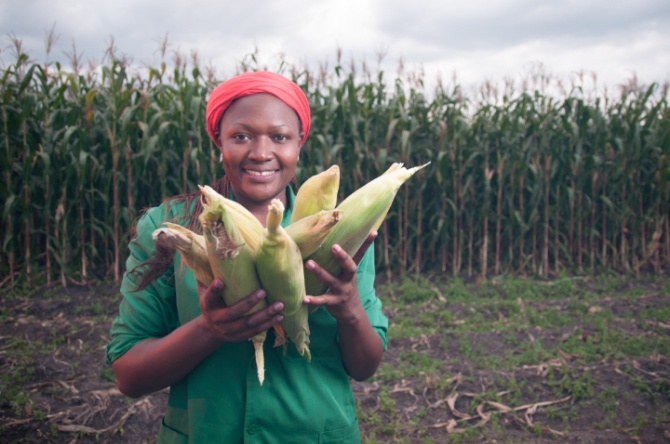
Recent international initiatives have helped improve women’s health and educational standards, and women are gradually playing a bigger role in economic and political activities around the world. But the pace toward gender equality is slow. One UN report notes that it will take 286 years to achieve full gender equality, including development of legal systems. Meanwhile, violence against women and girls persists, as do barriers to social advancement.
While women make a huge contribution to household income and community growth, particularly in developing countries, they are often forced to take low-paying, precarious work because of discrimination in the job market, social institutions, and local customs. According to a study conducted by the United Nations Conference on Trade and Development (UNCTAD), 74 percent of women in the non-agricultural sector in sub-Saharan Africa and 80 percent in South Asia are engaged in informal employment: earning low wages or being self-employed as small-scale vendors, shop owners, or migrant workers.
On the other hand, a study by McKinsey Global Institute has found that expanding women’s participation in the global economy to the same level as men would increase gross domestic product by $28 trillion, or 26 percent, over 10 years. And an International Labour Organization survey of 13,000 companies in 70 countries found that businesses that promoted gender diversity at the management level saw their profits rise by an average of 10 to 15 percent. Clearly, gender equality is key to promoting economic growth and bettering people’s lives.
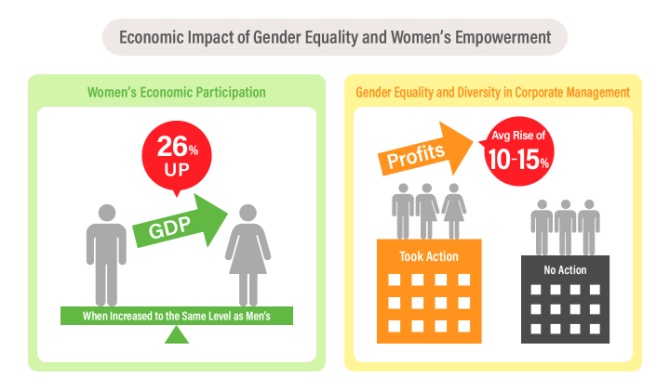
Sources: McKinsey Global Institute, “The Power of Parity: How Advancing Women’s Equality can add $12 Trillion to Global Growth,” 2015; ILO, “Women in Business and Management: The Business Case for Change,” 2019.
Kenya is a major agricultural country in eastern Africa. According to the World Bank, the agricultural sector accounts for 34.1 percent of the country’s GDP, and around 70 percent of farm workers are women. Women’s participation in society is relatively high in Kenya, but men have traditionally held positions of responsibility. The country ranks 128th out of 191 countries in the 2021 Gender Inequality Index of the United Nations Development Programme. Child marriages remain an issue, and health, welfare, and education standards of children need to be improved. Eliminating gender inequality and discrimination is a major social issue in Kenya.
Regen Organics, a founding partner of Sanergy Inc., is a company located in the Kenyan capital of Nairobi that recycles residual organic waste collected from agribusinesses, markets, restaurants, abattoirs, and sanitary toilets to produce and sell organic fertilizer, protein for animal feed, biofuel, and other products for agricultural use. Established in 2011, it now receives support through JICA’s Private Sector Investment Finance scheme. Regen Organics has pioneered an innovative circular economy business using insects that helps to resolve a number of social issues, such as public hygiene in slum areas and increasing the food supply.
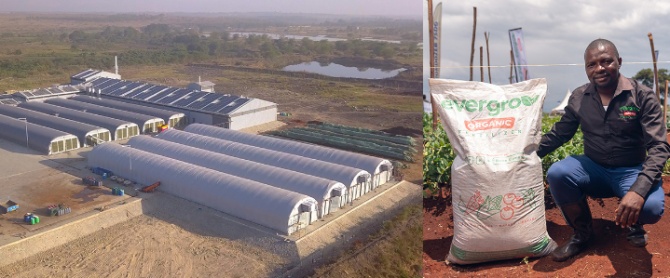
The recycling plant of Regen Organics in the outskirts of Nairobi, left, and its chief product, Evergrow organic fertilizer.
Regen Organics has actively hired women in recent years, since its main clients are female farmers and farm shops, who have many female employees. In April 2021, it launched a yearlong women’s empowerment project to further strengthen the recruitment and training of women for positions in factory operations, sales, and distribution.
One woman playing a key role at Regen Organics today is Agatha Kihiu, who leads a staff of 120 as a plant manager. Her family encouraged her to get a good education, and she was consequently able to find a job in the manufacturing industry. She became familiar with the practice of “kaizen” (a Japanese method for improving productivity)—a background that qualified her for the position she currently holds. “We should not limit our capabilities,” Kihiu maintains. “If we believe in our abilities, we can succeed.”
“The percentage of female workers at the Regen Organics recycling plant was less than 10 percent two years ago, but today it exceeds 30 percent,” Kihiu said. “And we hope to have an even higher share in the future. Women are very fast and accurate when it comes to work requiring meticulous attention, like packaging, and teams with women tend to be more productive. This has meant shorter working hours and less overtime, leading to a better work-life balance for all employees, including men. Everyone is happy with this initiative.”
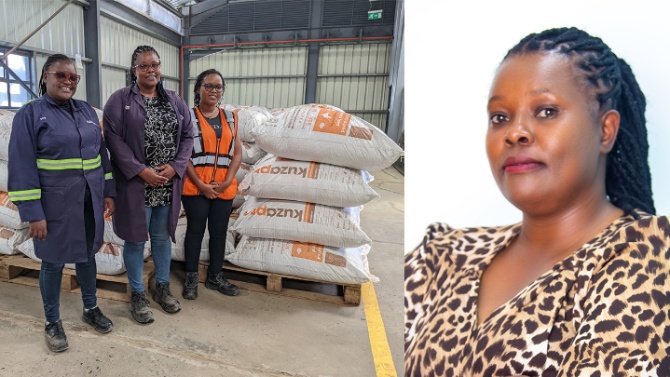
Regen Organics plant manager Agatha Kihiu is committed to bringing out the best in talented women.
Regen Organics also increased the number of female sales and distribution promoters from 12 to 57 and provided training on the company’s products and customer retention skills. As a result, the number of female farmer associations among the company’s clients increased from 54 to 138 and women-led farm shops from 104 to 184. The number of female farmers purchasing Regen Organics products has increased three-fold, from 334 to 977, and sales of the company’s Evergrow organic fertilizer have doubled. The one-year empowerment project has brought great growth and change to the company.
Kihiu served as a coach and mentor for the factory team, playing an integral role in enhancing women’s technical and leadership skills. This has heightened workplace morale, increased productivity among staff members, and bolstered the career prospects of women workers. She placed great effort into building a more supportive work environment and enhancing staff collaboration between men and women, such as by introducing flexible working hours and providing private rooms for new mothers to pump breastmilk.
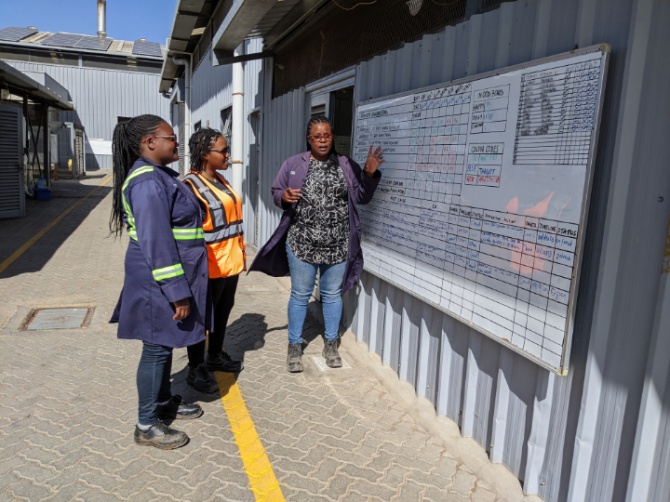
Kihiu oversees the manufacture of all three product lines at the plant that she manages.
In the future, Kihiu hopes to create training programs to increase the number of female leaders, especially women with science backgrounds. “Innovation is key to the manufacturing process. And innovation can be further accelerated through gender inclusion.”
No country has yet achieved full gender equality, including Japan and other developed countries. We need to learn from and work with each other toward this common goal. JICA promotes gender mainstreaming by incorporating gender perspectives into all its cooperation programs and projects. By building networks and strengthening partnerships with domestic and international organizations, experts, private-sector entities, and civil society, JICA aims to create synergies that lead to more impactful results.
Gender equality is an issue that tends to focus on the challenges faced by women, but it can also benefit men who are struggling with stereotypical perceptions of masculinity. Ideally, we should aim to build a society where everyone, regardless of gender, can live with dignity. And for this, it is important that we all work together and take appropriate action.
International Women’s Day offers a perfect opportunity to think about how we can learn from and help one another in helping build such a society.
scroll